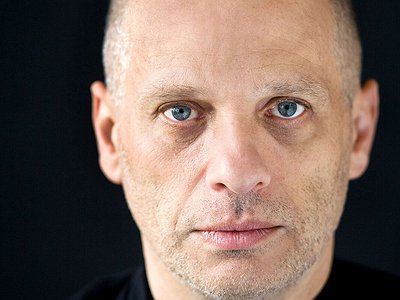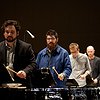Name: David Lang
Nationality: American
Occupation: Composer
Bands/Projects: Bang on a Can / opera / film composition / ballet / exhibition music / choral / solo / ensemble
Labels: Cantaloupe Music
Musical Recommendations: My fellow Bang on a Can composers Michael Gordon and Julia Wolfe are both great composers, and very different from each other. And a CD that has been in heavy rotation in my studio for the past few years is Dysnomia, by Dawn of Midi. Check it out!
When did you start composing - and what or who were your early passions and influences?
When I was 9, growing up in Los Angeles, I saw a film of one of Leonard Bernstein’s Young Persons Concerts with the New York Philharmonic. They played the first symphony of Dmitri Shostakovich. I was hooked immediately.
For most artists, originality is first preceded by a phase of learning and, often, emulating others. What was this like for you? How would you describe your own development as an artist and the transition towards your own voice?
I am not a big fan of this ‘originality’ stuff. As the question suggests, we begin by emulating other music we like. I am not sure that process ever ends - as we get more experienced we get better and better at getting to the heart of what we like in the music that we are emulating. We may begin by copying whole swaths of things we like from other music, and as we get more experienced we only need to remember smaller and smaller details, and most likely switch from repurposing details from other people’s music to repurposing details from our own. This year I used a little orchestrational detail in a piece that I originally heard in an obscure composition by a little-known composer, when I was 20 years old. I don’t think anyone would hear the similarity if you put the two details next to each other but I know that I have been waiting for the right time to remember it, and I finally did, 39 years later….
What were some of the most important creative challenges when starting out as a composer and how have they changed over time?
The biggest creative challenge for me and probably for anyone in a creative field is committing to making work before you know if you can actually do it. One of the strange things I think about all the time is that you have to commit yourself to everything that goes into living a creative life - to studying, to practicing, to long hours writing and rewriting, to putting off material rewards – long before you know if it will pay off. That is the scariest part of the business.
Tell us about your studio/work space, please. What were criteria when setting it up and how does this environment influence the creative process? How important, relatively speaking, are factors like mood, ergonomics, haptics and technology for you?
We live in a loft in SoHo, in New York, and when we moved in it was just one giant room. When we renovated it we wanted to keep it open, and I am happy to say that my studio is the only room in the place with a door on it. It is very messy, crammed with scores and CDs, and I have to climb a ladder to get up to it, but it really is the only truly private space in the loft.
Could you take me through the process of composing on the basis of one of your pieces that's particularly dear to you, please? What do you start with when working on a new piece, for example, how do you form your creative decisions and how do you refine them?
My pieces are all attempts to solve some kind of problem – I always begin with some question or thought about things we take for granted in the world, and I try to use the music to get to a possible solution. In my recent piece for choir and string quartet – the national anthems – I started by wondering if I could collect the most hopeful line of text in the anthem of every country in the world into a meta-anthem, one that I thought might contain all the hopes we share. What I found when I looked at the texts was that most of our anthems are violent and bloody and war-mongering. It was terrifying. So I started thinking that what we share is that we are all essentially afraid of each other, and I ended up writing the music to underline our common fear and fragility.
What, if anything, do you personally draw from the cosmos of electronic music and digital production tools that is inspiring for your daily practise? In how far do you see the potential for a mutual creative pollination between the two?
I am a very low-tech composer. Electronics and digital synthesis open up an unlimited range of options for composers, and for the right composer that limitlessness can be inspiring. What I am mostly interested in with my music, however, is how performers struggle with their very human limits, so electronics end up not being such a big part of my world.
How do you see the relationship between timbre and composition?
I think the most important and powerful part of music is its structure - how a piece is built architecturally, how an idea changes across time. For that reason timbre isn’t really that interesting to me. Or notes, or harmony, or instruments, for that matter. Those all seem like details to me. Imagine you need to go from your house to the store. Did you walk? Did you ride a bike? Drive a car? As a composer you have to choose some means of getting there but the only thing that matters is whether you got there.



